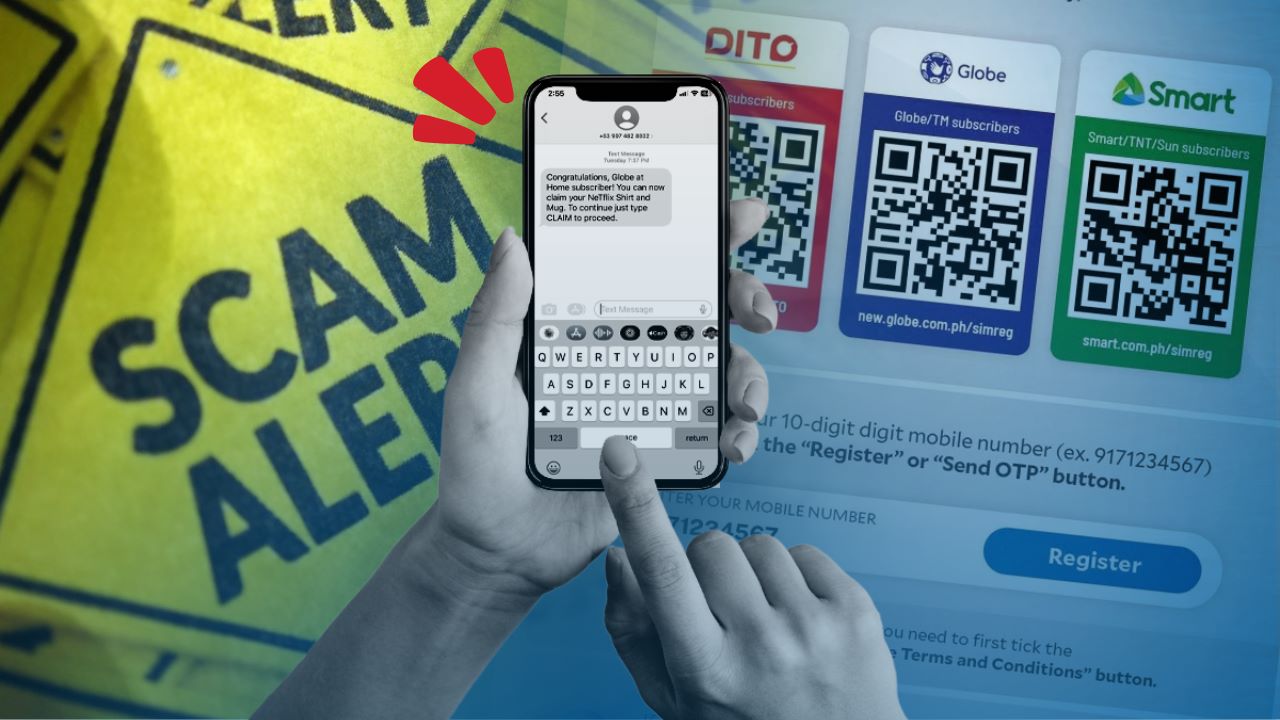
INQUIRER FILE PHOTOS/DANIELLA MARIE AGACER
MANILA, Philippines—The SIM Registration Act is said to be the way to curb scams, but since the mandated listing started, the National Telecommunications Commission (NTC) said there are new crooked schemes related to the registration that Filipinos should avoid.
Based on the latest data from the NTC, 17,115,910 SIM cards, or 10.13 percent of the 168,977,773 existing cards in the Philippines, had already been registered as of 11:59 p.m. on Tuesday (Jan. 10).
READ: DICT: Registered SIM card reach 16.56M out of 170M
Almost three weeks since the listing started, Smart Communications Inc. (Smart) has already registered 8,037,862 SIM cards, while Globe Telecom Inc. (Globe) has 7,556,037. DITO Telecommunity Corp. (DITO) has listed 1,522,011.
The latest numbers reflect a big spike from the 3,319,005 registered SIM cards in the first two days of the mandated registration last year—Smart (1,019,207), Globe (1,769,374), and DITO (530,424).
GRAPHIC Ed Lustan
According to the NTC, Smart has already registered 11.82 percent of its 67,995,734 subscribers, while Globe’s 7,556,037 registered SIM cards translate to 8.60 percent of 87,873,936. DITO, meanwhile, has listed 11.61 percent of its 13,108,103 subscribers.
READ: SIM card registration: A step-by-step guide
But while registration numbers continued to rise, the NTC and the Department of Information and Communications Technology (DICT) issued serious warnings against new scams that could victimize Filipinos who intend to register their SIM cards.
- There’s no pre-registration process
Last Dec. 23, the DICT said there were email messages supposedly sent by telecommunications companies to their subscribers regarding the SIM Registration Act, which was implemented starting on Dec. 27.
The email messages tell subscribers with registered accounts with their provider’s virtual and mobile payment applications that their accounts are being restricted in line with the law and will only be reactivated through a supposed pre-registration process.
However, the DICT and NTC advised the public to exercise caution on the email messages, stressing that subscribers should not provide personal details to the senders or click on links included.
- There’s no SIM card registration fee
The NTC said on Wednesday (Jan. 11) that there are some individuals online who are asking for fees in exchange for assistance in SIM card registration, but “the public should not engage with them.”
It was reiterated by the NTC that subscribers should be cautious in dealing with these scammers, saying that providing personal details to someone can lead to identity theft, hacking of mobile banking applications, and other cybercrimes.
This, as the SIM card listing requires the registrant to provide his or her name, age, address, mobile number, photo, and a government issued identification (ID) card, like passport, driver’s license, and voter’s ID.
The NTC said pursuant to Section 6 of the law, the registration shall be implemented at no cost to end-users, while telecommunications companies are mandated to ensure that all data are secure and protected.
As stated by the NTC, SIM card registration assistance services will be made available at retail and service centers of the telecommunications companies.
- Don’t buy pre-registered SIM cards
One of NTC’s latest warnings is about registered SIM cards being sold in the black market, advising the public not to buy any pre-registered cards.
NTC Deputy Commissioner Jon Paulo Salvahan told ABS-CBN News that the person registered for the SIM card will be the one liable in case the card was used for crimes.
RELATED STORY: SIM card registration: Things the public must remember
As explained by the DICT, this was the reason that selfie verification is an important part of the registration process as it helps in preventing the possibility of selling pre-registered SIM cards.
GRAPHIC Ed Lustan
‘Listen to our concerns’
The Junk SIM Registration Network, which is an alliance of digital experts and consumers, said the NTC should have seen these new fraudulent schemes coming.
Maded Batara III, the network’s spokesperson, said: “We have been saying repeatedly that this SIM registration law is not the solution to scams because scammers will always find a way to steal people’s information and scam people’s money.”
GRAPHIC Ed Lustan
“We hope that the NTC will now listen to the concerns of privacy and information technology experts and reconsider the implementation of the law,” Batara told INQUIRER.net on Friday (Jan. 13).
He said “the amount of information that we have to give to the telecommunications companies, and how this information can be used for nefarious purposes when placed in the wrong hands, is one of the major reasons why we need to call to junk the SIM registration law in the first place.”
The network recently held a protest action at the NTC to call for the suspension of the law because of “glaring violations to data privacy two weeks into its implementation.”
“We also must continue to be vigilant regarding measures that violate the right of the people to privacy. We cannot let our personal information fall into the hands of those who will use it for profit or to scam the people,” Batara said.
DICT, NTC optimistic
But despite these, the DICT and NTC said the government remains optimistic that the registration of SIM cards, which will last until April 26, will be successful.
READ: Never worry: It’s 180 days until you register your SIM card – solon
“Our aim is to register at least one million SIMs every day. Currently, we are on track, but there could be a lull, and then a surge again once we are near the deadline,” Communications and Technology Undersecretary Anna Mae Yu Lamentillo said.
She said the telecommunications companies are continuously improving their registration processes to ensure a smooth listing experience for end-users.
RELATED STORY: Make SIM registration as ‘easy as texting,’ Poe says; Gatchalian warns vs GCash scam
To recall, Sen. Grace Poe, chairperson of the Senate public services committee, said the government and telecommunications companies must ensure that registration will be convenient.
“The SIM registration should be as easy as texting or sending a message,” she said.